

Pesticide Exposure Found to Lower Intelligence. Pesticides, ubiquitous among not only the food supply but farms and homes worldwide, have been found to be creating lasting changes in overall brain structure — changes that have been linked to lower intelligence levels and decreased cognitive function.

Previously linked in scientific research to the massive obesity crisis, pesticides are now known to impact the mind in ways that are still not entirely understood. Despite these findings, they are continually touted as safe by the profit-hungry chemical industry. The study, published in the Proceedings of the National Academy of Sciences, observed pregnant mothers in New York who were exposed to a pesticide known as chlorpyrifos (CPF). Banned in 2001 from household use, the chemical is still used worldwide in agriculture.
That’s right, this is a chemical that is not permitted to be used in your home, though it is perfectly fine to spray on your food. From around the web: Human genes engineered into experimental GMO rice being grown in Kansas. (NaturalNews) Unless the rice you buy is certified organic, or comes specifically from a farm that tests its rice crops for genetically modified (GM) traits, you could be eating rice tainted with actual human genes.
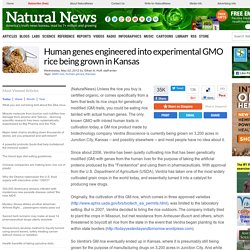
The only known GMO with inbred human traits in cultivation today, a GM rice product made by biotechnology company Ventria Bioscience is currently being grown on 3,200 acres in Junction City, Kansas -- and possibly elsewhere -- and most people have no idea about it. Since about 2006, Ventria has been quietly cultivating rice that has been genetically modified (GM) with genes from the human liver for the purpose of taking the artificial proteins produced by this "Frankenrice" and using them in pharmaceuticals. With approval from the U.S. Department of Agriculture (USDA), Ventria has taken one of the most widely cultivated grain crops in the world today, and essentially turned it into a catalyst for producing new drugs. You can view that report here: Permalink to this article: Monsanto Receives ‘F’ on Sustainable Agriculture Test.
9inShare Share By Jameson Spivack Monsanto, the agricultural biotechnology corporation perhaps most known for its controversial genetically modified (GM) crops, has been given the failing grade of ‘F’ for sustainability by the Union of Concerned Scientists (UCS).
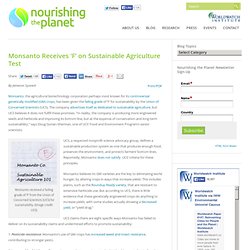
The company advertises itself as dedicated to sustainable agriculture, but UCS believes it does not fulfill these promises. “In reality, the company is producing more engineered seeds and herbicide and improving its bottom line, but at the expense of conservation and long-term sustainability,” says Doug Gurian-Sherman, one of UCS’ Food and Environment Program’s senior scientists. Monsanto received a failing grade of ‘F’ from the Union of Concerned Scientists (UCS) for sustainability. UCS, a respected nonprofit science advocacy group, defines a sustainable production system as one that produces enough food, preserves the environment, and protects farmers’ bottom lines. 1. 2. 3. 4. 5. 6. 8.
Similar posts: MONSANTO. Monsanto Patents and Chemtrails. Barbara H.
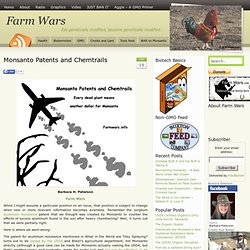
Peterson Farm Wars While I might assume a particular position on an issue, that position is subject to change when new or more relevant information becomes available. Remember the sorghum aluminum resistance patent that we thought was created by Monsanto to counter the effects of excess aluminum found in the soil after heavy chemtrailing? Well, it turns out that we were partially right. Here is where we went wrong: The patent for aluminum resistance mentioned in What in the World are They Spraying? Judge Dismisses Organic Farmers' Case Against Monsanto : The Salt. Hide captionFarmer Alan Madison fills a seed hopper with Monsanto hybrid seed corn near Arlington, Illinois, U.S.
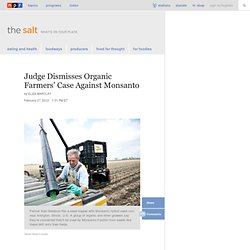
A group of organic and other growers say they're concerned they'll be sued by Monsanto if pollen from seeds like these drift onto their fields. Daniel Acker/Landov Farmer Alan Madison fills a seed hopper with Monsanto hybrid seed corn near Arlington, Illinois, U.S. A group of organic and other growers say they're concerned they'll be sued by Monsanto if pollen from seeds like these drift onto their fields.
A New York federal court today dismissed a lawsuit against agribusiness giant Monsanto brought by thousands of certified organic farmers. The Organic Seed Growers and Trade Association and several other growers and organizations do not use Monsanto seeds. Instead, the judge found that plaintiffs' allegations were "unsubstantiated ... given that not one single plaintiff claims to have been so threatened. " Last year, the U.S. Judge Sides with Monsanto, Ridicules Farmers' Rights. Judge Sides with Monsanto, Ridicules Farmers' Rights On February 24th, we received the disappointing news that federal Judge Naomi Buchwald dismissed the case of family farmers versus Monsanto.
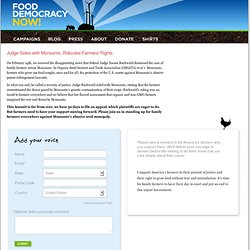
In Organic Seed Growers and Trade Association (OSGATA) et al v. Monsanto, farmers who grow our food sought, once and for all, the protection of the U.S. courts against Monsanto’s abusive patent infringement lawsuits. In what can only be called a travesty of justice, Judge Buchwald sided with Monsanto, stating that the farmers overestimated the threat posed by Monsanto’s genetic contamination of their crops.
Buchwald’s ruling was an insult to farmers everywhere and we believe that her flawed assessment that organic and non-GMO farmers imagined the very real threat by Monsanto. Big Agro Business.